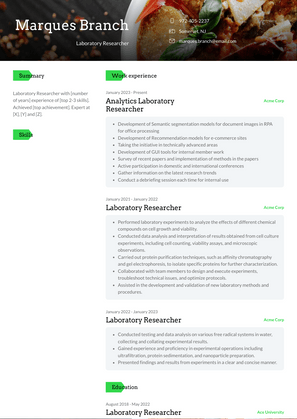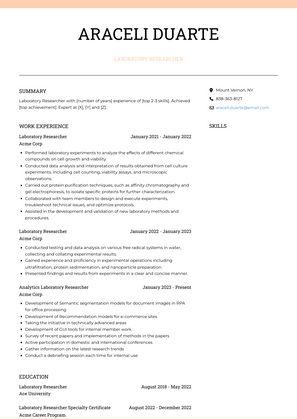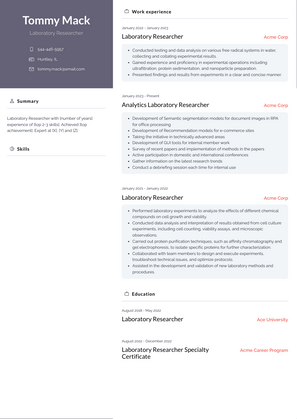Laboratory Researcher Resume Examples and Templates
This page provides you with Laboratory Researcher resume samples to use to create your own resume with our easy-to-use resume builder. Below you'll find our how-to section that will guide you through each section of a Laboratory Researcher resume.



How to Write a Laboratory Researcher Resume?
To write a professional Laboratory Researcher resume, follow these steps:
- Select the right Laboratory Researcher resume template.
- Write a professional summary at the top explaining your Laboratory Researcher’s experience and achievements.
- Follow the STAR method while writing your Laboratory Researcher resume’s work experience. Show what you were responsible for and what you achieved as a Laboratory Researcher.
- List your top Laboratory Researcher skills in a separate skills section.
How to Write Your Laboratory Researcher Resume Header?
Write the perfect Laboratory Researcher resume header by:
- Adding your full name at the top of the header.
- Add a photo to your resume if you are applying for jobs outside of the US. For applying to jobs within the US, avoid adding photo to your resume header.
- Add your current Laboratory Researcher to the header to show relevance.
- Add your current city, your phone number and a professional email address.
- Finally, add a link to your portfolio to the Laboratory Researcher resume header. If there’s no portfolio link to add, consider adding a link to your LinkedIn profile instead.
Bad Laboratory Researcher Resume Example - Header Section
Cason 35 Marshall Drive Chardon, OH 44024 Marital Status: Married, email: cooldude2022@gmail.com
Good Laboratory Researcher Resume Example - Header Section
Cason Reilly, Chardon, OH, Phone number: +1-555-555-5555, Link: linkedin/in/johndoe
Make sure to add a professional looking email address while writing your resume header. Let’s assume your name is John Doe - here is a formula you can use to create email addresses:
- firstnamelastname@email.com - johndoe@email.com
- firstname.lastname@email.com - john.doe@email.com
- lastname.firstname@email.com - doe.john@email.com
- f.lastname@email.com - j.doe@email.com
- l.firstname@email.com - d.john@email.com
- firstnamelastname12@email.com - johndoe12@email.com
For a Laboratory Researcher email, we recommend you either go with a custom domain name (john@johndoe.com) or select a very reputed email provider (Gmail or Outlook).
How to Write a Professional Laboratory Researcher Resume Summary?
Use this template to write the best Laboratory Researcher resume summary: Laboratory Researcher with [number of years] experience of [top 2-3 skills]. Achieved [top achievement]. Expert at [X], [Y] and [Z].
How to Write a Laboratory Researcher Resume Experience Section?
Here’s how you can write a job winning Laboratory Researcher resume experience section:
- Write your Laboratory Researcher work experience in a reverse chronological order.
- Use bullets instead of paragraphs to explain your Laboratory Researcher work experience.
- While describing your work experience focus on highlighting what you did and the impact you made (you can use numbers to describe your success as a Laboratory Researcher).
- Use action verbs in your bullet points.
Analytics Laboratory Researcher Resume Example
Analytics Laboratory Researcher
- Development of Semantic segmentation models for document images in RPA for office processing
- Development of Recommendation models for e-commerce sites
- Taking the initiative in technically advanced areas
- Development of GUI tools for internal member work
- Survey of recent papers and implementation of methods in the papers
- Active participation in domestic and international conferences
- Gather information on the latest research trends
- Conduct a debriefing session each time for internal use
Laboratory Researcher Resume Example
Laboratory Researcher
- Conducted testing and data analysis on various free radical systems in water, collecting and collating experimental results.
- Gained experience and proficiency in experimental operations including ultrafiltration, protein sedimentation, and nanoparticle preparation.
- Presented findings and results from experiments in a clear and concise manner.
Laboratory Researcher Resume Example
Laboratory Researcher
- Performed laboratory experiments to analyze the effects of different chemical compounds on cell growth and viability.
- Conducted data analysis and interpretation of results obtained from cell culture experiments, including cell counting, viability assays, and microscopic observations.
- Carried out protein purification techniques, such as affinity chromatography and gel electrophoresis, to isolate specific proteins for further characterization.
- Collaborated with team members to design and execute experiments, troubleshoot technical issues, and optimize protocols.
- Assisted in the development and validation of new laboratory methods and procedures.
Top Laboratory Researcher Resume Skills for 2023
- Experimental Design and Methodology
- Laboratory Safety Protocols and Practices
- Laboratory Equipment Operation and Maintenance
- Sample Collection and Preparation Techniques
- Data Collection and Analysis
- Scientific Instrumentation and Techniques (e.g., spectrophotometry, chromatography)
- Cell Culture Techniques
- DNA/RNA Extraction and Purification
- Polymerase Chain Reaction (PCR)
- Gel Electrophoresis
- Western Blotting
- Enzyme-Linked Immunosorbent Assay (ELISA)
- Microscopy Techniques (e.g., light microscopy, electron microscopy)
- Flow Cytometry
- Immunohistochemistry (IHC)
- Immunofluorescence (IF)
- Protein Expression and Purification
- Tissue Culture Techniques
- Gene Cloning and Transformation
- Gene Expression Analysis
- Bioinformatics and Genomics Analysis
- Cell Viability and Proliferation Assays
- Assay Development and Optimization
- Statistical Analysis of Research Data
- Data Visualization and Presentation
- Literature Review and Citation Management
- Laboratory Quality Control and Assurance
- Biosafety and Biosecurity Practices
- Molecular Biology Techniques
- Immunology Techniques
- Biochemistry Techniques
- Microbiology Techniques
- Genetic Engineering and Manipulation
- Drug Discovery and Development
- High-Throughput Screening
- Laboratory Information Management Systems (LIMS)
- Research Ethics and Compliance
- Scientific Writing and Publication
- Grant Writing and Proposal Development
- Research Project Management
- Laboratory Inventory and Supply Management
- Collaboration and Teamwork
- Troubleshooting and Problem-Solving
- Time Management and Project Prioritization
- Laboratory Waste Management
- Laboratory Safety Audits and Inspections
- Scientific Presentations and Poster Design
- Intellectual Property Protection
How Long Should my Laboratory Researcher Resume be?
Your Laboratory Researcher resume length should be less than one or two pages maximum. Unless you have more than 25 years of experience, any resume that’s more than two pages would appear to be too long and risk getting rejected.
On an average, for Laboratory Researcher, we see most resumes have a length of 2. And, that’s why we advise you to keep the resume length appropriate to not get rejected.
Copyright ©2025 Workstory Inc.
